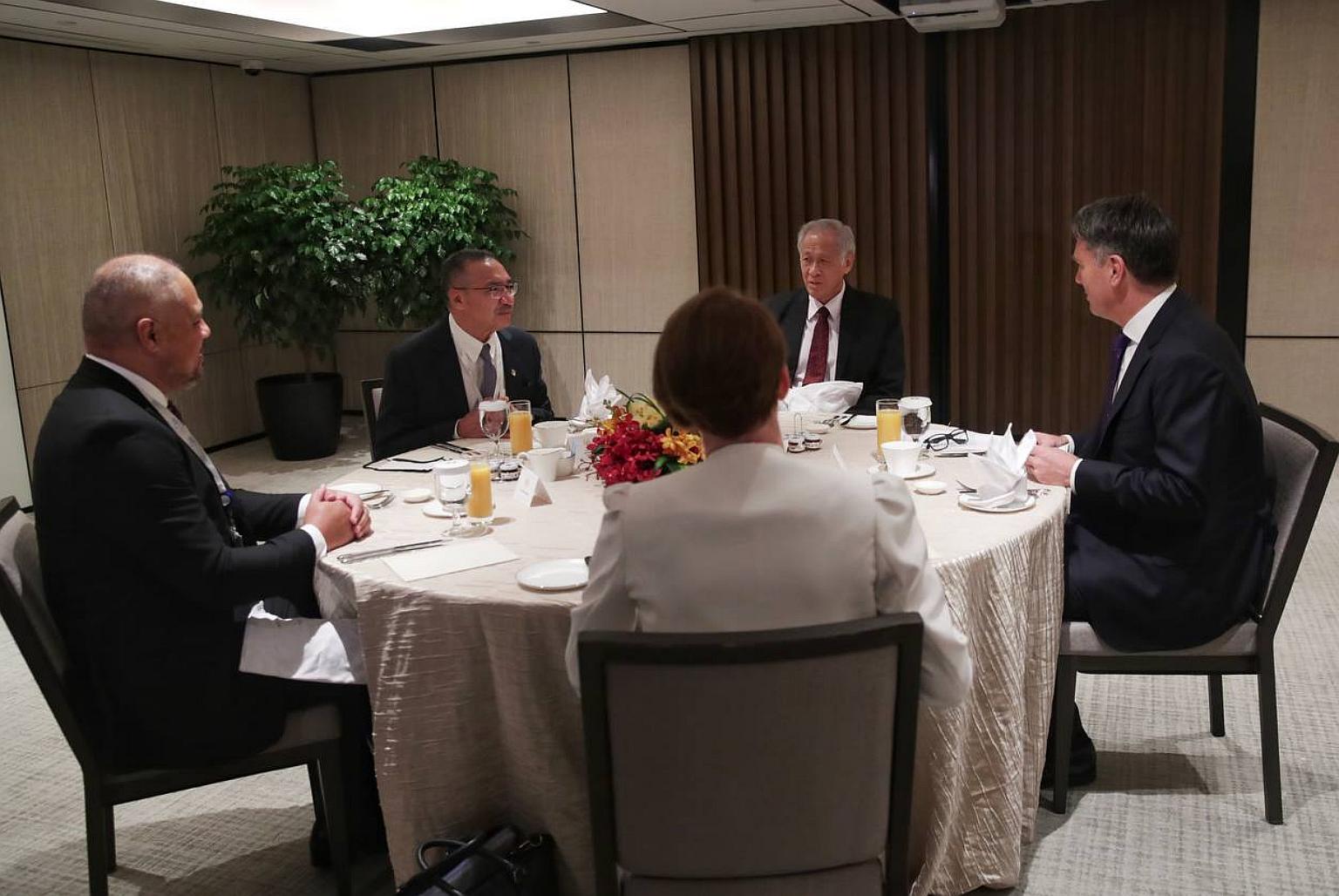Shangri-La Dialogue: Five Power Defence Arrangements members seek 'modern relevance' for pact
Sign up now: Get insights on Asia's fast-moving developments

Singapore Defence Minister Ng Eng Hen (second from right) hosting (from left) New Zealand Minister of Defence Peeni Henare, Malaysia Senior Minister of Defence Hishammuddin Hussein, British High Commissioner to Singapore Kara Owen (in white) and Australia Minister for Defence Richard Marles on June 11, 2022.
ST PHOTO: GIN TAY
Follow topic:
SINGAPORE - On the back of the golden jubilee of the Five Power Defence Arrangements (FPDA) last year, its member countries on Saturday (June 11) discussed ways to grow and give it modern relevance.
The FPDA is looking at maritime security and counter-terrorism, as well as how to work together to deal with humanitarian issues and the securing of supply chains, said Australia Deputy Prime Minister and Defence Minister Richard Marles.
"All of these are fields in which we can work to give the FPDA modern relevance which we are really keen to do," he told reporters after an FPDA meeting on the sidelines of the Shangri-La Dialogue.
"Because relationships such as (what) we have now between old friends - where there is a genuine warmth - is something that is really precious in the modern world and we want to make sure we want to build on that going forward," he said.
Mr Marles and representatives from Britain, New Zealand and Malaysia were hosted to breakfast by Singapore's Defence Minister Ng Eng Hen at the Shangri-La Hotel where security conference Shangri-La Dialogue is being held.
The other representatives were Malaysia's Senior Minister for Defence Hishammuddin Hussein, New Zealand Defence Minister Peeni Henare and British High Commissioner to Singapore Kara Owen.
The theme of ensuring the relevance of the FPDA - which Dr Ng called "the grandfather of multilateral arrangements" - was echoed by the others at the meeting.
Consisting of Britain, Australia, New Zealand, Malaysia and Singapore, the FPDA was formed in 1971 with the aim of safeguarding the external defence of Singapore and Malaysia, amid the withdrawal of British forces from the Republic.
In response to a question on how the FPDA fits in with new and renewed groupings in the region, such as the Quad and Aukus, Mr Marles said: "The relevance of the FPDA is based on 50 years of history."
"Aukus and the Quad have their roles, and we're obviously committed to that architecture as well, but something which is as enduring as the FPDA is really precious to Australia."
The Quad is a dialogue grouping consisting of the United States, Australia, India and Japan. The security partnership among Australia-United Kingdom-US, or Aukus, was announced last year.
Adding to Mr Marles' response, Dr Ng said the difference is that the FPDA has very "mature" exercises, such as Bersama Gold and Bersama Shield, with large numbers of troops meeting regularly.
Last year, the FPDA marked its 50th anniversary with Exercise Bersama Gold in November - the first FPDA exercise to be conducted physically as a field training exercise since the Covid-19 pandemic - involving some 2,600 troops.
Mr Hishammuddin noted the value of FPDA as a platform to manage incidents between countries that have the potential to escalate tensions.
He was responding to a question on how the FPDA navigates regional tensions, such as a recent incident between a Chinese fighter jet and Australian maritime surveillance aircraft in the South China Sea.
The Malaysian minister said if such platforms do not exist, there would not be any opportunity to manage incidents that could go out of control.
In a statement, Singapore's Ministry of Defence (Mindef) said the representatives discussed the important role of the FPDA in building confidence and promoting a rules-based international order.

Mindef added that the FPDA contributes constructively to the regional security architecture.
PHOTO: ST FILE
They also exchanged views on ways to deepen existing cooperation in conventional defence domains, as well as grow collaboration in non-conventional and emerging domains, to ensure that the FPDA remains relevant in addressing contemporary security challenges.
Mindef added that the FPDA contributes constructively to the regional security architecture through the conduct of regular exercises, dialogues and platforms for professional interactions.
Mr Henare said New Zealand's commitment to the arrangement is unwavering.
"(It is) also an opportunity to allow us to prioritise and regenerate our military and our cooperation collectively as we seek towards perhaps another 50 years and carving out a future legacy for us," he added.
Ambassador Owen noted that the FPDA has managed to continue with its exercises even through the challenges of the pandemic last year.
"This morning's discussion is really an excellent one on how we can continue to keep that relevance going forward."

